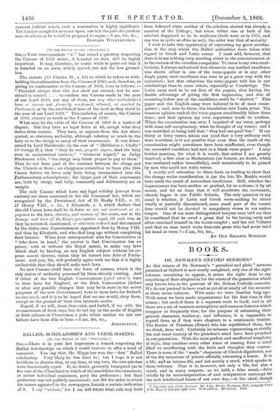[TO THE EDITOR OF THE " S1'ECTATOR.1
SIR,—Your correspondent "C." has raised a question respecting the Canons of 1603 which, if founded on fact, will be highly important. It may, therefore, be worth while to point out that it is founded on an error, widely spread, but not the less ground- less.
The statute (13 Charles IL, c. 12) to which he refers as with- holding its confirmation from the Canons of 1640, and, therefore, as giving its confirmation to the Canons of 1603, runs as follows :— "Provided always that this Act shall not extend, nor be con- strued to extend. . . . to confirm the Canons made in the year of our Lord 1640, nor any of them, nor any other ecclesiastical laws or canons not formerly confirmed, allowed, or enacted by Parliament, or by the established laws of the land as they stood in the year of our Lord 1639." This excludes, of course, the Canons of 1603, exactly as much as the Canons of 1640.
What may be the value of the Canons of 1603 is a Matter of dispute. But they have no legal force at all, except what they derive from custom. They have, as appears from the Act above quoted, no statutory authority, although relating as much to the laity as to the clergy in many of their enactments. It was deter- mined by Lord Hardwicke (in the case of "Middleton v. Crofts" 10 George II.), that "they do not, proprio viyore, bind the laity even in ecclesiastical matters," "whatever regard," as Judge Blackstone adds, "the clergy may think proper to pay to them." They do not form part of the contract between the clergy and the Church or State ; no clergyman subscribes to them (the 36th Canon derives its force only from being incorporated into the Parliamentary subscription) ; the larger part of their enactments are, both by clergy and laity, constantly and deliberately set at naught.
The only Canons which have any legal validity (except from custom) are those contained in the old Canonical law, which are recognized by the Provisional Act of 25 HenI7 VIII., c. 19, 27 Henry VIII., c. 15., 1 Elizabeth, c. 1, which declare that the old Canon laws shall be in force as are not controvert or re- pugnant to the laws, statutes, and customs of this realm, nor to the damage and hurt of the King's prerogative royal, till such time as they be reviewed, sanctioned, or otherwise ordered and determined by the thirty-two Commissioners appointed first by Henry VIII. and then by Elizabeth, and who died long ago without completing their labours. When your correspondent asks for Convocation to "take them in hand," the answer is that Convocation has no power, with or without the Royal assent, to make any laws which shall be binding on any English subject without his ex- press assent thereto, unless they be turned into Acts of Parlia- ment. And you, Sir, will probably agree with me that it is highly undesirable that they should make such laws.
No new Canons could have the force of custom, which is the only status of authority possessed by those already existing. And if either of the two English Convocations (quod absit 0 were to issue laws for England, or the Irish Convocation (before or after any possible changes that may be in store in the secret purposes of the new Government) were to issue laws for Ireland, no one need, and it is to be hoped that no one would, obey them, except on the ground of their own intrinsic merits.
Repeal, if we will, those that exist, and forbid, if we will, the re-enactment of fresh ones, but do not lay on the necks of English or Irish citizens or Churchmen a yoke which neither we nor our fathers have been able to bear.—I am, Sir, &c.,
ANGLICANUS.


































 Previous page
Previous page